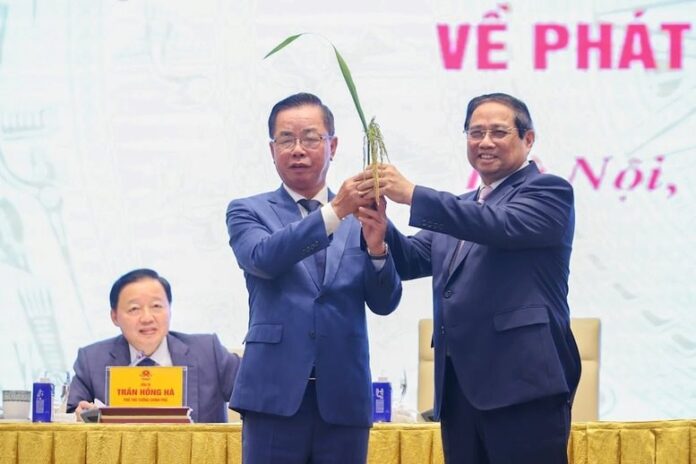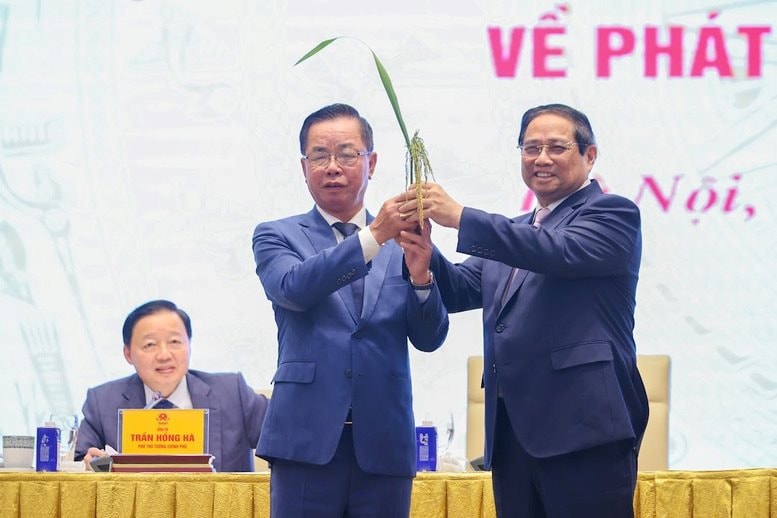
Mr. Tran Manh Bao presents the Prime Minister with a gift of a multi-grain rice ear. Photo: VGP
This concerns
the field of agriculture.
According to statistics, in recent years, agriculture has contributed approximately 12-14% to Vietnam’s GDP. This sector is also considered the “backbone” of Vietnam’s economy.
In 2024, the Vietnamese agricultural sector continued its strong transition from a production mindset to an agricultural economic mindset, and from single-sector development to multi-sector collaboration and development. As a result, the sector’s total production value still achieved a fairly high increase of about 3.3%, with a forest coverage rate of 42%, the rate of communes meeting new rural standards estimated at 78.7%, and the rate of rural households using clean water according to norms and standards at 58%. Notably, the sector’s total export turnover reached a record high of about $62.5 billion.
Recently, at the
Dialogue with Enterprises and Enterprise Associations to Effectively Implement Resolution 68-NQ/TW of the Politburo on Private Economic Development, there were also proposals and recommendations related to the field of agriculture.
The dialogue was held on the morning of May 31st and chaired by Prime Minister Pham Minh Chinh. With the attendance of more than 1,000 delegates representing enterprises, enterprise associations, business households, and cooperatives, the dialogue served as a forum to listen to contributions and recommendations on policies, tasks, and solutions for private economic development in the coming time, thereby affirming the position and role of the private economy and making important contributions to the rapid and sustainable socio-economic development.
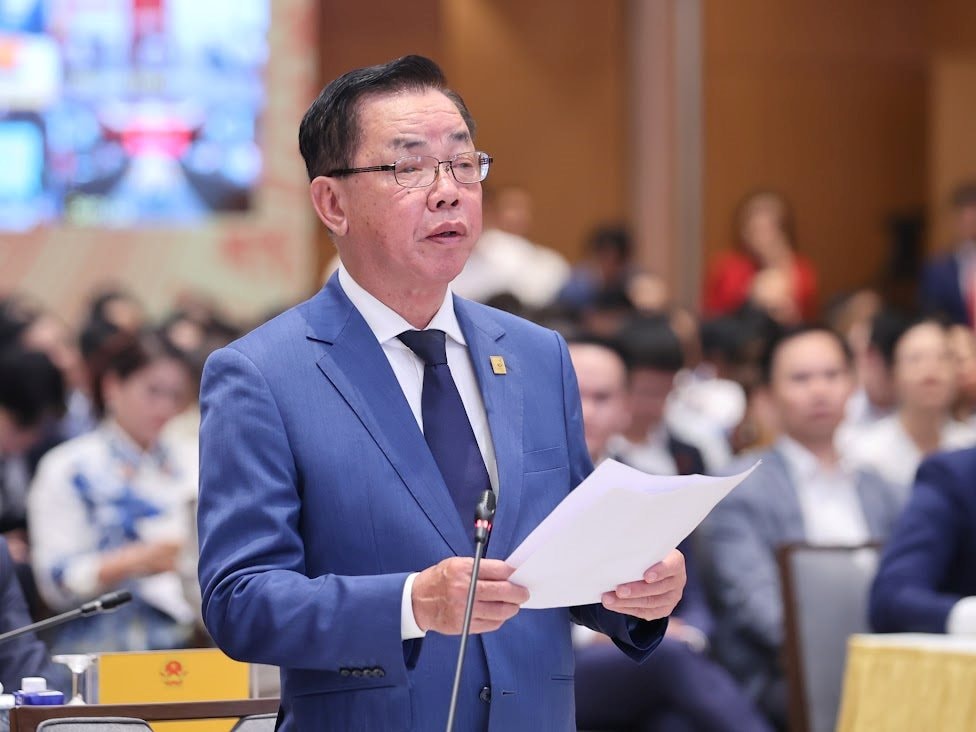
Labor Hero, Chairman of the Board of Directors and General Director of ThaiBinh Seed Group, and Chairman of Vietnam Plant Variety Trade Association Tran Manh Bao, speaks at the dialogue. Photo: VGP
At the dialogue, Labor Hero, Chairman of the Board of Directors and General Director of ThaiBinh Seed Group, and Chairman of Vietnam Plant Variety Trade Association Tran Manh Bao, shared that to bring Resolution 68 of the Politburo into life and make it a driving force for the country’s economy, he would like to share some difficulties that enterprises are facing.
First, regarding land policies for crop research and development, land is the foundation of agricultural production. This is a prerequisite for enterprises to develop, research, and experiment with production. However, access to land remains problematic, with lengthy procedures and a lack of a separate legal framework for science and technology enterprises to use land for research, testing, breeding, and production. This prevents many enterprises from expanding and setting directions.
Second, the current tax and credit mechanisms are inadequate, and access to preferential capital for innovation is challenging despite the policies in place. Moreover, science and technology funds are limited and lack an open mechanism for enterprises to easily access.
Third, there is an overlap between the Law on Science and Technology and the Law on Planting.
Fourth, small and medium-sized enterprises face challenges in accessing and applying digital transformation and lack specific support policies.
Given these difficulties, Mr. Tran Manh Bao would like to make the following proposals:
First,
the state should soon develop and issue a separate mechanism for science and technology enterprises in the field of agriculture, including land, credit, tax, and training.
Second, amend the Law on Planting to align with other laws.
Third, create innovation support funds, prioritizing private enterprises with research and application capabilities.
Fourth, establish and issue a mechanism for cooperation and technology transfer between the private and public sectors.
Notably, at the dialogue,
Mr. Tran Manh Bao impressed the delegates by bringing a rice ear with 1,247 grains. This entrepreneur gifted this multi-grain rice ear to Prime Minister Pham Minh Chinh.
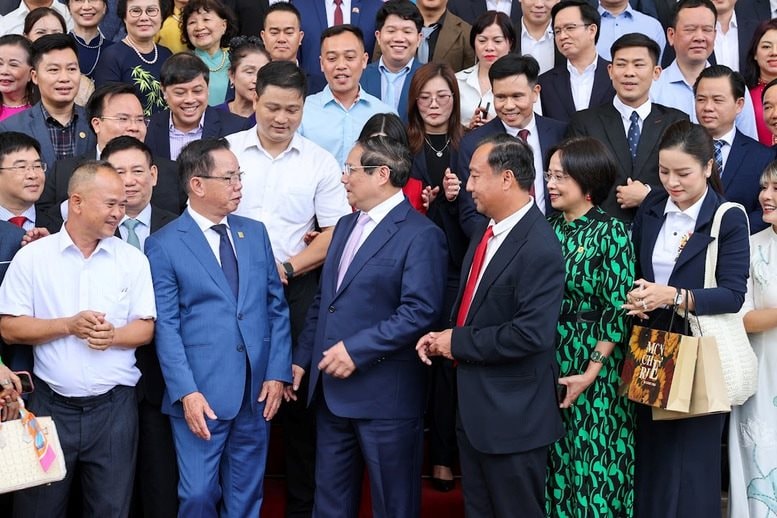
The Prime Minister exchanges with enterprises after the dialogue. Photo: VGP
Speaking at the dialogue, Prime Minister Pham Minh Chinh emphasized that the resolutions of the Politburo, National Assembly, and Government are very consistent and comprehensive. The main desire is to implement them effectively and efficiently.
“Of course, we have to do it, but before we do, we must ‘think deeply and act big’, and our thoughts must be ripe… Based on this, we unify the way we do things to be most effective. How can we mobilize the power of nearly one million enterprises and five million business households? How can we best utilize their contributions? When everyone and every household contribute, society will have a great source of strength. Only then can we turn the situation around, change the state, and develop the country rapidly and sustainably,” said the Government leader.
Minister of Agriculture and Environment Responds to ThaiBinh Seed’s Proposal
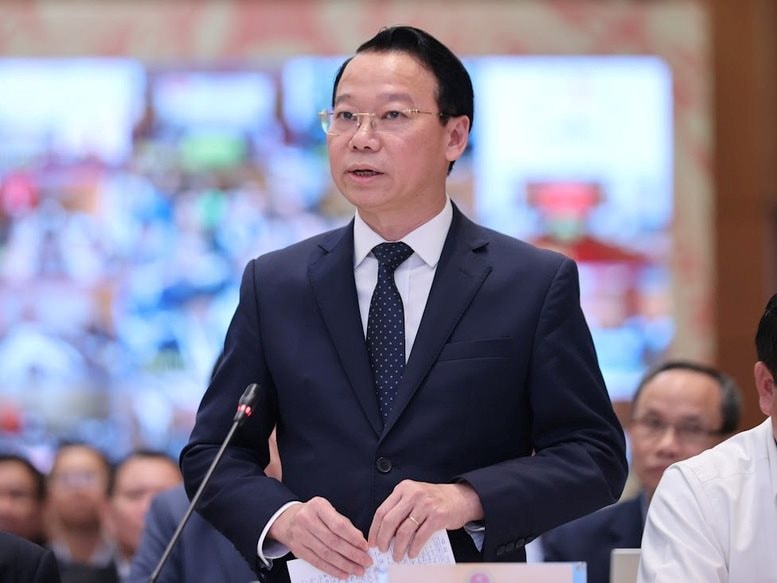
Minister of Agriculture and Environment Do Duc Duy responds to some proposals from enterprises at the dialogue. Photo: VGP
After listening to the proposals and recommendations of some enterprise representatives and associations, the Minister of Agriculture and Environment, Do Duc Duy, shared some thoughts related to the enterprises’ proposals, especially regarding access to land and production facilities.
First, according to the Minister, an important new point in Resolution 68 of the Politburo, Resolution 198 of the National Assembly, and Resolution 139 of the Government is the requirement for localities to mandatorily allocate land funds in industrial parks for high-tech enterprises, small and medium-sized enterprises, and innovative enterprises. The minimum ratio is set at 20 hectares or 5% of the area of each industrial park. This regulation also facilitates enterprises’ access to land with infrastructure, helping to reduce investment time and costs.
Accordingly, the Ministry of Agriculture and Environment will closely coordinate with relevant ministries and sectors to concretize this content in the Government’s guiding documents to best support enterprises.
In addition, the Ministry of Agriculture and Environment also proposed that relevant ministries and sectors coordinate to clarify some other difficulties in the case of land allocation for medical facilities. The Ministry of Agriculture and Environment will work with other ministries and sectors to concretize this in the Government’s new guiding document to facilitate enterprises.
Regarding some proposals of Mr. Tran Manh Bao, the Minister of Agriculture and Environment said:
“We acknowledge this, and I also have a direct appointment to work at ThaiBinh Seed in the near future to listen to the difficulties, not only in the field of agriculture and the environment but also related to other fields.”
The Minister of Agriculture and Environment emphasized: “For matters within our authority, we will resolve them immediately. For matters beyond our authority, we will synthesize and report to the Government and the Prime Minister.”
Notable issues include land use policies for enterprises operating in the field of agricultural science and technology; proposals to amend and supplement the Law on Planting and the Law on Plant Protection and Quarantine, especially regulations related to crop management.
“In the long run, to fundamentally resolve the current difficulties, we are developing a draft Law amending and supplementing a number of articles of laws related to the fields of agriculture and the environment, with a scope of up to 17 specialized laws. It is expected that the draft will be submitted to the National Assembly at the upcoming October session. Once passed, this law will comprehensively address the current difficulties and inadequacies,” said Minister Do Duc Duy.

